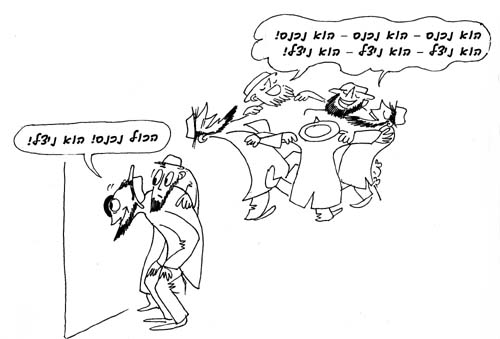
The early sages (the Tanaaim) made rules about the situations in which one is permitted to save a person even at the cost of the life of the person pursuing and endangering. Thus, for example, they ruled that one may kill a person who is trying to kill another or who is trying to rape a betrothed virgin. As a rule, they stated that one is permitted to kill any man who tries to rape a virgin for whom, had they consensual sex, they would both be violating prohibitions against forbidden sexual relations — raping a betrothed woman, a man, his own sister…as long as the victim is a virgin. If the victim is not a virgin, one is forbidden to kill the rapist to save the victim. How did Chazal interpret the Scriptures to come to this conclusion? It is written about the rape of a girl: “But you shall do nothing to the young woman; there is in the girl [spelled nun ayin reish, as is the spelling for “boy”] no sin deserving of death” (Deuteronomy 22:26). Since the word is spelled as “boy” is spelled, they interpreted it to mean that one may kill a person who is attempting to rape a man. Since it is read as the word for “girl,” (though that is not what is written), they interpreted it to mean that one may kill a person who is attempting to rape a virgin betrothed woman. The word “sin” they learned as including anyone who attempts to rape a woman for whom the punishment for consensual sex would be meted out by the Heavens (G-d will cut off his soul in the World to Come). From the word “death” they learned that one may kill a person who attempts to rape a woman for whom, had they consensual sex, the punishment would be death. The scholars asked: If so, if one may kill a person who tries to rape his own sister, why do we demand the rapist pay a fine? It is an established rule in Jewish law that if one is liable to the death penalty one is exempt from fines. Answer: The permission to kill the rapist is only until he has achieved partial penetration. After he has achieved partial penetration one is forbidden to kill him, because at that point the victim is no longer a virgin, though she retains her hymen. On the other hand, the rapist’s fine applies only after penetration and the tearing of the hymen. Since when the fine is incurred he is exempt from the death penalty, one who rapes his own sister is required to pay the fine. The scholars then asked: The answer above coincides with the opinion of those sages who say that partial penetration is any contact between the male sexual organ and the female sexual organ, but according to those sages who define penetration as the glans of the male sexual organ entering, the hymen would be torn, so the death penalty and the fine would be incurred at the same time. A sage, Rav Hisda, answered that the fine is incurred by one who rapes his sister if she has previously had anal sex, and so is still technically a virgin. Jewish law rules that if one rapes his sister, who has previously had anal sex, others are forbidden to kill him to save her from the rape, but he is liable to a fine.
(Babylonian Talmud, Tractate Sanhedrin 73a-b)
